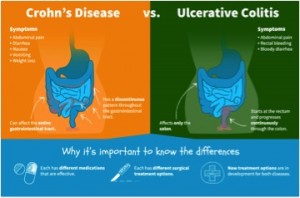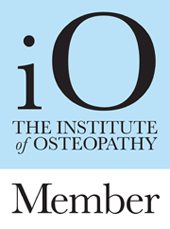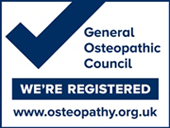Crohn’s Disease vs Ulcerative Colitis
Did you know that Irritable Bowel Disease (IBD), including Ulcerative Colitis (UC) and Crohn’s disease, reportedly affects over 2.5 million Europeans (3,000,000 in the UK) (1).
Whilst the diagnosis is not clear cut, there is some over-lap between both conditions. UC and Crohn’s are the result of an immune system that has gone awry, turning to attack ‘itself’ – a classic marker of autoimmune disease. As the name implies, both are the result of ‘inflammation’ but they differ in respect of the parts of the gastrointestinal tract that are usually affected.
Crohn’s disease can affect any part of the gut, though the most common area affected is the end of the ileum (the last part of the small intestine), or the colon.
Ulcerative Colitis causes inflammation and ulceration of the inner lining of the rectum and colon (the large bowel). In UC, tiny ulcers develop on the surface of the lining and these may bleed and produce pus.

Common symptoms
Symptoms vary from person to person, ranging from mild to severe depending on where in the gut the disease is active. The symptoms can also change over time (2).
- Abdominal pain and diarrhoea
- Cramping pains in the abdomen
- Tiredness and fatigue
- Feeling generally unwell or feverish
- Mouth ulcers
- Loss of appetite and weight loss
- Anaemia (a reduced level of red blood cells)
A variety of other health conditions may also be associated with Crohn’s disease and UC, including:
- Skin problems e.g. mouth ulcers, blisters and ulcers on the skin, painful red swellings (usually on the legs)
- Inflammation of the eyes
- Thinner and weaker bones
- Liver inflammation
- Blood clots (including deep vein thrombosis)
- Anaemia (a reduced level of red blood cells)
- Inflammation of the joints (usually elbows, wrists, knees and ankles). More rarely, the joints in the spine and pelvis become inflamed – a condition called ankylosing spondylitis.
Nutritional considerations
Only recently have doctors been looking at dietary factors including fibre and fat intake as underlying drivers of the disease – or as factors with the potential to shift the microbiome (gut flora) towards healing.
There are an abundance of holistic nutrition books such as The Maker’s Diet (Jordan Rubin); Breaking the Vicious Cycle (Elaine Gottschall); Self-Healing Colitis and Chron’s (David Klein). What is common amongst all three authors is the importance of eliminating processed food and refined sugars as well as most grains. With the inclusion of ‘whole foods’ and healthy oils such as flaxseed, pumpkin and coconut oil.
Summary of findings
- Remove carbohydrates – in particular Gluten from the diet but also rye, wheat and barley.
- Remove lectins (proteins found mainly in food plants), especially grains and the nightshade plants. The main members of the nightshade family you will want to be familiar with include: potatoes, eggplant (aubergine), tomatoes and peppers.
- Avoid coffee – this can deplete nutrients and for some, can be hard on the digestive tract
- Choose your fats wisely: Omega-3 fatty acids in the diet are linked to a reduced risk of UC while diets high in Trans-fats may be associated with an increased risk of IBD (3). Coconut oil is also a good ‘saturated’ fat that has been shown to have antiviral, antibacterial and antifungal properties. In recent studies it has also been shown to improve small intestine inflammation (4).
- Drink bone broth http://recipes.mercola.com/bone-broth-recipe.aspx
- Make you own sauerkraut. Beware: with IBD, introducing too many fermented foods all at once can be irritating to the gut lining at first, so be mindful to introduce this slowly into the diet e.g. a teaspoon at a time. https://www.culturesforhealth.com/learn/recipe/natural-fermentation/sauerkraut/
- Positive mental attitude – try and reduce stressors where possible. Psychological stress has long been reported anecdotally to increase disease activity in inflammatory bowel disease (IBD), and recent well designed studies have confirmed that adverse life events, chronic stress, and depression increase the likelihood of relapse in patients with quiescent IBD (5).
- Adequate sleep – try and aim for 7-9 hours of quality sleep per night. This may help to support the body’s healing process and may impact positively on IBD (6).
Contact Emma our nutritional therapist this week for your individual consultation: 01525 290615 / [email protected]
References
- https://www.wddty.com/magazine/2017/november/8-ways-to-heal-your-gut-1.html. World J Gastroenterol, 2017; 23:4735-43
- https://www.crohnsandcolitis.org.uk/about-inflammatory-bowel-disease/crohns-disease
- Ananthakrishnan, A. N., Khalili, H., Konijeti, G. G., Higuchi, L. M., de Silva, P., Fuchs, C. S., … Chan, A. T. (2014). Long-term Intake of Dietary Fat and Risk of Ulcerative Colitis and Crohn’s Disease. Gut, 63(5), 776–784. http://doi.org/10.1136/gutjnl-2013-305304
- http://digitalcommons.wku.edu/cgi/viewcontent.cgi?article=2264&context=theses
- Mawdsley, J. E., & Rampton, D. S. (2005). Psychological stress in IBD: new insights into pathogenic and therapeutic implications. Gut, 54(10), 1481–1491. http://doi.org/10.1136/gut.2005.064261
- Swanson, Garth R, Helen J Burgess, and Ali Keshavarzian. “Sleep Disturbances and Inflammatory Bowel Disease: A Potential Trigger for Disease Flare?” Expert review of clinical immunology7.1 (2011): 29–36. PMC. Web. 28 Oct. 2017.


